- Home
- Julie Berry
Lovely War Page 6
Lovely War Read online
Page 6
The conductor, James Reese Europe, takes the stage. A giant of a man in a glittering white tuxedo. The audience bursts with pent-up applause, like a tidal wave rolling through the auditorium and rippling up its balconies. Silence falls. The time is now.
Even Aubrey’s confidence falters for a moment, then. How does “The Clef Club March” begin? When do they modulate? His fingers freeze. He’s going to ruin everything. Jim Europe’s going to kill him. Uncle Ames, who taught him to play, will kill him twice. He’ll never play in Harlem again. He wipes the sweat on his palms off onto his gray trouser legs.
Then Aubrey sees sweat shining on Jim Europe’s face. He’s not the only one nervous. Europe’s peculiar eyes bulge behind his thin-rimmed glasses. It always makes his glare intense. Tonight it’s ferocious.
Europe raises his baton. The entire room takes one deep breath.
Music explodes that night in New York.
Nothing, nothing like this has ever echoed off an elite concert hall’s carved walls.
The audience includes critics, reviewers, professors, performers. The city’s musical elite. They’re swept up in the flood like everyone else. They’ll talk of this night for years.
Here is a new musical phenomenon. Not songs written for black musicians by white composers. Not humiliating parodies that grope for a laugh, joking at the black singers’ expense. Black composers and lyricists, black musicians, excellent in their own right. Not merely excellent, but daring and vibrant and wholly original. J. Rosamond Johnson and Paul Laurence Dunbar. Harry T. Burleigh and Will Marion Cook. Paul C. Bohlen, and of course, James Reese Europe himself.
From the moment the music takes off, Aubrey Edwards never stops grinning. All his jitters peel away. His wrists are limber, his elbows loose. He’s fueled by the crowd’s excitement.
Attitudes explode, though the evidence would yet be long and slow in coming. Black music would begin to command not only popularity but respect for its originality and power.
For James Reese Europe and his Clef Club Orchestra, the night is a triumph. The orchestra gave and the audience received, and their rapport swelled to a crescendo of its own.
Aubrey Edwards fell in love that night. Not with piano; he’d always loved that. With performing. With audiences. If he could have his wish, he’d play for crowds every night for the rest of his life.
I heard his wish, and I blessed it.
Aubrey Edwards would have his wish at a price, following Jim Europe around the world, performing all the way to the gates of hell, in the killing fields of France.
APOLLO
Spartanburg—October 13, 1917
COME WITH ME now to Spartanburg, South Carolina, five years later. It’s October 13, 1917, a hot autumn night. The people of Spartanburg are gathered to hear an outdoor concert. White soldiers from the training camp come in uniform. White civilians come in plaid shirts and flowered skirts, clutching cold beers and glasses of sweet tea to keep cool while they listen to “colored music.”
“Colored,” of course, isn’t the word they use.
The Clef Club Orchestra is no more. In its place is the Army Band of the Army National Guard, 15th New York Infantry Regiment, with Lieutenant James R. Europe conducting a goodwill concert for the people of Spartanburg, home to the army training base Camp Wadsworth. Goodwill indeed.
Moths flutter at streetlights. Silhouetted against a purpling sky, the band tunes their instruments in squawks and scales and riffs. The sound is a discordant mess, but pregnant with anticipation: from this chaos, order and excitement will come.
Aubrey Edwards twiddles drumsticks between his long fingers. He is tense, apprehensive about surviving this concert. The 15th New York goes to bed at night wondering if they’ll wake up to morning reveille, or to a midnight lynch mob.
The 15th New York Infantry, an all-black regiment, came to Camp Wadsworth for combat and weapons training after basic training at Camp Dix in New Jersey, where Southern soldiers hung NO COLOREDS ALLOWED and WHITES ONLY signs on buildings.
When Spartanburg learned a black regiment would be stationed at Camp Wadsworth, the governor of South Carolina went to Washington to lobby the government not to send black soldiers into their state. Spartanburg’s mayor, the son of a Confederate soldier, told a New York Times reporter, “With their Northern ideas about race equality, they will probably expect to be treated like white men. I can say right here that they will not be treated as anything except Negroes. We shall treat them exactly as we treat our resident Negroes. This thing is like waving a red flag in the face of a bull. . . . You remember the trouble a couple of weeks ago in Houston.”
I know you remember Houston, Ares. It was practically a one-night war. A white police officer had entered a black woman’s home without a warrant, searching for a suspect. When she protested, he beat and arrested her, dragging her from her home though she wasn’t fully dressed. When a black soldier saw this and tried to intervene to defend the woman, the white policeman pistol-whipped the black soldier, seriously injuring him. The men of the beaten soldier’s regiment, learning no consequences would befall the white policeman, felt abandoned by white police and army officials. They saw the abuse as a last straw in a long string of injustices. So they marched into the city. Soldiers and civilians died in the shooting that followed.
This concert is trying to prevent another Houston. To prove that black soldiers aren’t all mutineers or murderers. Aubrey Edwards and his fellow musicians feel they’d better smile and play like their lives depend upon it.
Private Aubrey Edwards, now twenty, is a few inches taller, a good deal broader, and substantially nimbler on the piano. He wants to take the ragtime world by storm and leave his mark on the new world of American jazz. He already sees his name in lights.
His rhythmic sense is mature for his age as a musician, and his improvisation is crazy-wild. Sometimes too wild, thinks Lieutenant Europe, who became his piano tutor once Aubrey surpassed his uncle Ames, but Europe can see that this wild kid is going somewhere. He doesn’t mean the trenches of France.
But that’s precisely where Aubrey’s going, if General Pershing can figure out what to do with a black regiment. Who’ll command them? Who’ll fight alongside them? It’s a problem.
America has finally joined the Great War. Germany’s torpedoing of American ships has awakened the sleeping giant, and the Zimmermann Telegram didn’t help matters any. Americans who’d wanted to leave Europeans to their own destruction now sing a different tune.
Aubrey enlisted in the regiment that spring, along with his pal Joey Rice and most of their friends. For music dreams, not dreams of soldier’s glory. He’d be paid to play ragtime with Jim Europe all over Europe (“they named it after me,” as Jim liked to say). Practically a professional musician! Of course, he’d have to shoot a rifle in the bargain, too.
Playing with the soldiers’ band sounded better than dressing like a toy soldier every day to operate the elevator at a high-rise office building in Midtown Manhattan. It had been the best job he could find after leaving school. But there are only so many times you can smile and wish “Good morning” to white men in suits who don’t answer, nor even look at you, before you start to question your own existence. If he stayed here, he might push elevator buttons for the rest of his life. Coming back as a veteran soldier—maybe even a war hero!—he’d have a future. And if he didn’t come back from “Over There . . .” Well, he just would. That was all.
There’s only one piano available for the concert on the green in Spartanburg, and Private Luckey Roberts is playing it. So Private Edwards doubles on percussion. Baritone Noble Sissle sings, all swing and eyebrows and charm, and the white ladies melt. He’s a handsome devil, but a black one. So they melt, but only up to a point, especially if their husbands are watching.
The 15th Army Band is a smash hit in Spartanburg. They might be insulted by shopkeepers during the day, kicked into g
utters by town toughs, even threatened by mob attack from an Alabama regiment, but the 15th New York National Guard band’s music is just too good to ignore. Spartanburg can’t help clapping its hands and tapping its feet. Younger folks break out dancing, right on the green. They don’t want black musicians in hotel lobbies, but blowing a horn to Jim Europe’s up-tempo beat is fine and dandy.
Yet danger still hovers like a sparking storm cloud. Aubrey, who could drum blindfolded, sees pretty girls dancing. He’s been cooped up with men and only men for weeks, and he’d like to take a second look. In New York, he could, but here? No pretty face is worth swinging from a tree.
His mother’s letters are full of urgent warning. She grew up in Mississippi. She knows about lynching. Aubrey wonders if he’ll die in his country before he ever gets the chance to die for his country. Either way, he’d rather not.
The concert ends, and the soldiers march in perfect military form back toward their barracks. The crowd drifts home. Anger’s been appeased, but only for tonight. Another week, and tensions will overflow. The army, hoping to prevent a race riot, will decide there’s no good place in the States to put them, and no English-speaking outfit anywhere along the Western Front that will serve beside them. So they’ll hand them off to the French Army like a goodwill offering. No, toss them like a hot potato.
No, lob them like a hand grenade.
DECEMBER 1942
Intersection
“NOT,” ARES SAYS, “that I would ever object to hearing a story about a soldier, but how did we get from a British girl and her soldier boyfriend to this piano-playing American recruit? Did I miss something?”
“Their stories intersect,” Apollo explains. “Soon.”
Ares shrugs. “I mean, not that it matters to me.”
Of course not.
“Want me to stick around, Goddess?” inquires Apollo.
“Certainly,” she tells him. “There’s so much more to tell. We’ve only barely begun.”
APHRODITE
Royal Albert Hall—November 25, 1917
AT ONE O’CLOCK, Hazel Windicott went down to the street, circled the King’s Whiskers, and made for their doorway meet-up. In her stomach lurked a silent fear: James wouldn’t be there.
She almost missed him. He leaned against the doorway where they’d spoken before.
“Look at you,” he said.
“I can’t, unless you’ve brought a mirror,” she told him.
Somehow it was harder, not easier, to meet each other again, this third time together, now that they knew each other a little better. More wonderful, but more unsure; there were no more polite formalities to hide behind. No script at all. The poor darlings.
“Let’s get out of here,” James proposed, and Hazel seized his hand and dragged him down the street at a run. “Hold a moment.” He laughed. “You’re in better trim than I am.” She wasn’t, really, but between laughing and running, James could scarcely draw a proper breath.
He pulled a train schedule and a map from his pocket. “All right, then, Miss You-Don’t-Know-London-Do-You,” he said. “I’ll have you know that I’ve got matters all figured out.”
“Oh?”
“S’right. We’ll head up to the train station at Bow. From there, we’ll take the District Railway to Gloucester Road”—he squinted at his notes—“and we’ll take the Piccadilly Line one stop up, to Kensington High Street. From there, we walk to Hyde Park.”
“Impressive, my Man About Town,” said Hazel.
“None of that, now.” Dimples again.
They reached the station, bought tickets, boarded the train, then collapsed into seats. The train pulled out, and London slid by. James watched the skyline. It was the more gentlemanly option than staring at Hazel.
“You notice every grand building, don’t you?”
“Do I?”
“What sorts of buildings do you favor?”
No one had asked him that before. He looked to see if she was merely struggling to make polite conversation, but she watched his face with open curiosity. She really wanted to know.
“Of course I like the grand old buildings. The guildhalls and churches and government palaces.” He turned toward her. “But what really interests me is less, oh, showy, and more useful. Take hospitals. Ever since the war, we haven’t had near enough. They could be bigger, too, and more modern. Better plumbing and wiring. I’ve been reading about it.”
“Will we need such hospitals after the war ends?” asked Hazel.
“You mean, if it ever does.” He immediately regretted it.
She laid her hand on his arm. “Don’t say that. It must.”
He risked a look into her eyes. “I was a kid when it began,” he said. “I have to remind myself life was normal once. Cousins gathering over Easter holidays. Summer visits to my gran on the coast. Playing at the beach. Making castles in the sand.”
Hazel, with neither siblings nor young cousins, saw this rosy picture wistfully.
“One older cousin died in the fighting at the Somme,” he said. “The other lost a leg.”
Hazel leaned against his shoulder. “What were they like?”
He stared out the window. “Footballers.” He smiled sadly. “Will was light on his feet. Mike was quick. You should’ve seen them.”
“The war must end before long,” said Hazel. “They can’t be insane enough to let it last forever. Besides, the Americans are coming. I expect the Germans are terrified of them.”
He laughed ruefully. “I suppose a German’s at least as tough as an American. But the Americans will have the numbers on their side, once enough of them get here.” He sighed. “I wish a couple million would arrive this week. If the war ended Saturday, I wouldn’t have to go.”
Hazel threaded her arm through his elbow.
“Let’s hope they will come,” she said. “Millions on Monday. Millions on Tuesday. Extra millions on Wednesday.”
He smiled, but his eyes were sad. “I’m a coward, aren’t I?” he said. “Now you know.”
She reached up and pulled his chin to face her. “Not a coward,” she said firmly. “You’d like to live, and who wouldn’t?” She smiled. “I’d like you to live, too.”
Her face was so near, and her eyes so warm. It took all of James’s self-command not to kiss her, there on the train. Not like this, he told himself. Not here.
“All right, then.” He managed a smile. “For your sake, I will live. Since you want me to.”
Why wouldn’t he kiss her? Hazel tried not to mind. Her gaze kept sliding down to his inescapable lips.
“I do want you to live,” she said. “Hurry on back, and build those hospitals.”
“Not only hospitals,” he said. “Factories. Warehouses. Apartments. With the train lines expanding, there’ll be a need for more homes, schools, more communities along the routes. The building magazines all say so. If, after the war, I could study architecture . . .” He caught himself. Surely he was putting the piano girl into a coma of boredom. “Sorry. Listen to me nattering on!”
“I am listening,” she said. “I think it’s marvelous. You should have an ambition.” She frowned. “I wish I had a clearer one myself.” She gazed out the window at drab buildings abutting the tracks. “In Poplar there are awful slums, down near the docks. St. Matthias’s runs charities for dockworkers’ families. But I suppose selling jam at bazaars and old books at jumble sales won’t fix anything, will it?”
“Not unless you’ve got an awful lot of books and jam.”
They only just barely caught the conductor’s announcement that they’d reached Gloucester Road. After changing for the Piccadilly Line, they got off at Kensington High Street and followed the press of bodies into the slanting afternoon light. Grayish, wintry-green Hyde Park led them to the Royal Albert Hall, which loomed like an ocean voyager. They joined streaming throngs of con
certgoers at the entry doors, then climbed flight after flight of stairs, to the level just below the gallery at the very top.
Hazel marveled at the drop beneath them, past two tiers of balconies, to the stage below.
“I’m sorry these were the best seats I could get,” James said.
“Don’t be silly,” she said. “This is breathtaking.” She peeped over the rail. She swallowed. “How high up are we?”
“Best not to think of it.”
James helped Hazel out of her coat, then eased out of his and sat. Spectators up at this level were fewer and scattered, so they were, for all intents, alone. With four thousand other people. He felt all arms and hands, with no place to put them, and a terrible dread that he might wrap them around Hazel and not let go. He jammed his hands under his thighs.
Hazel watched the flood of humanity streaming in. She commented on the size of the grand piano and the number of seats for the orchestra. She was never dull, never bored. Always alert and interested. He thought of all he’d said on the train. He’d never spoken at such length to a girl who wasn’t a relative. He could talk to Hazel all day, all year, for a lifetime, forever.
Hazel gestured to the music hall. “How would you like to have built this little place?”
“Little!” He looked about the vast room. “Designing it would’ve been fun,” he said. “All that weight to support, and no columns to block the view. But I wouldn’t be one of the chaps on the scaffolding, plastering ceilings. Not for the Crown Jewels.”
She laughed. “I don’t like heights much, either,” she said, “but for the Crown Jewels, I think I’d give ceiling plastering a try.”
“You’re braver than I am.” He grinned. “You should be the one going off to the war.”
She sat up at this. “Do you know? Sometimes I wish I were.” She saw his surprised face. “I don’t mean fight in the trenches. I don’t think I’d be cut out for that.” She smiled. “I knew some girls in school who would give Jerry an awfully stout whack in the shins, given the chance. But not me. And I’d make a terrible nurse. All that blood! I’d be sick on the operating table.”

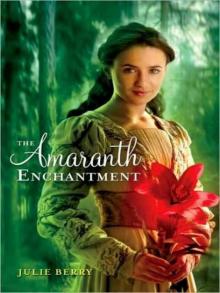 The Amaranth Enchantment
The Amaranth Enchantment Secondhand Charm
Secondhand Charm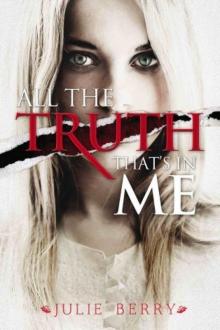 All the Truth That's in Me
All the Truth That's in Me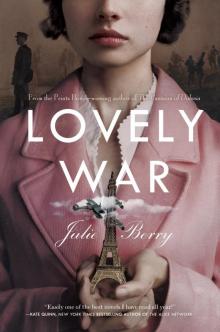 Lovely War
Lovely War The Emperor's Ostrich
The Emperor's Ostrich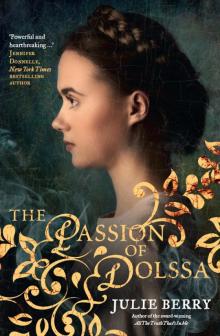 The Passion of Dolssa
The Passion of Dolssa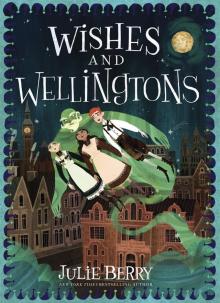 Wishes and Wellingtons
Wishes and Wellingtons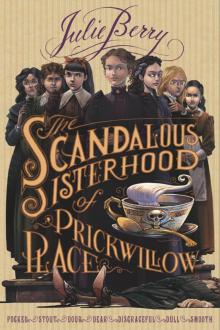 The Scandalous Sisterhood of Prickwillow Place
The Scandalous Sisterhood of Prickwillow Place Amaranth Enchantment
Amaranth Enchantment